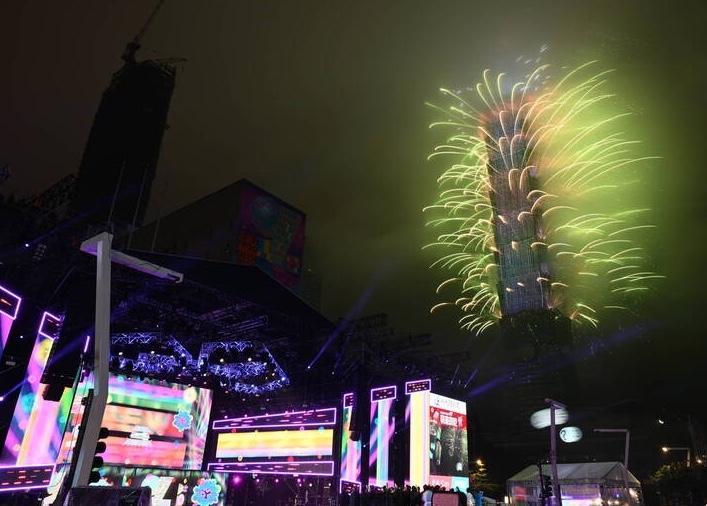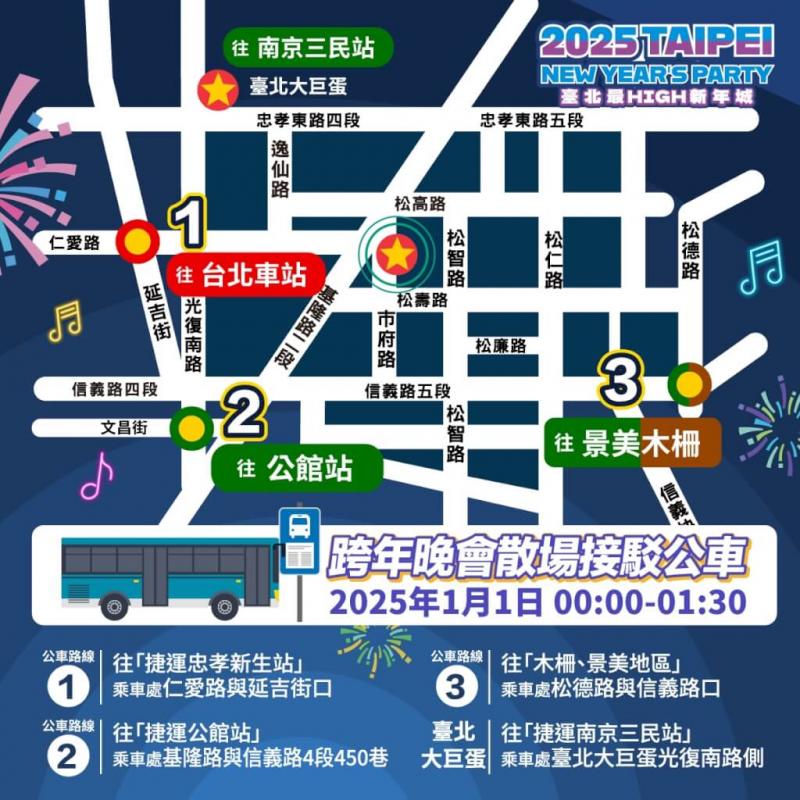The Taipei MRT is open all night tonight following New Year’s Eve festivities, and is offering free rides from nearby Green Line stations.
Taipei’s 2025 New Year’s Eve celebrations kick off at Taipei City Hall Square tonight, with performances from the boy band Energy, the South Korean girl group Apink, and singers Gigi Leung (梁詠琪) and Faith Yang (楊乃文).
Taipei 101’s annual New Year’s firework display follows at midnight, themed around Taiwan’s Premier12 baseball championship.

Photo: Chen I-kuan, Taipei Times
Estimates say there will be about 200,000 people in attendance, which is more than usual as this year’s celebrations overlap with A-mei’s (張惠妹) concert at Taipei Dome.
There are three shuttle buses in the area heading toward MRT stations that run from midnight to 1:30am.
The first leaves from the Renai Road and Yanji Street intersection, heading toward Taipei Railway Station.

Photo: Humans of Taipei Facebook
The second leaves from the Guangfu S Road and Wenchang Street intersection next to Keelung Road Sec 2, heading toward Gongguan Station.
The third leaves from the Songde Road and Xinyi Road Sec 6 intersection, heading toward Jingmei and Muzha stations.
There is one more shuttle bus running from midnight to 2am that leaves from the Guangfu S Road and Zhongxiao E Road intersection, heading toward Nanjing Sanmin Station.
The Taipei MRT runs for 24 hours on New Year’s Day, except for the Xiaobitan and Xinbeitou lines, which close at midnight.
As most people took the Blue and Red lines in previous years, it is recommended to walk or take a shuttle bus to Nanjing Sanmin or Taipei Arena stations to take the Green Line.
Catching the Green Line from either of those stations is free from midnight to 6am.
The Taoyuan MRT is to run for 41 consecutive hours from 6am today to 11pm tomorrow.
Starting from 5pm today, 33 YouBike stations in the Xinyi area are to be closed, with 22 more stations closing at 7pm.
The stations open again at 3am.
Taipei police will also take measures to control traffic flows in Xinyi District (信義) this evening.
A three-phase traffic control plan is to be implemented in Xinyi between 7pm and 3am, the Taipei Police Department's Traffic Division said, as it urged motorists to take note of the restrictions.
In Phase 1 from 7pm to 8pm, the controlled area includes west of Songren Road, south of Zhongxiao E Road, north of Xinyi Road, and east of Keelung Road and Yixian Road.
Vehicles within the controlled area are allowed to exit, but not enter.
In Phase 2 from 8pm to 10pm, the controlled zone is to expand to the west to Guangfu S Road.
Vehicles are prohibited from entering or exiting the controlled area.
The Keelung Road underground passage will also be closed.
from 10pm to 3am, the controlled area includes east of Guangfu S Road, south of Zhongxiao E Road, north of Xinyi Road and Zhuangjing Road, and west of Lane 236 of Zhongxiao E Road Sec 5, Songde Road and Songren Road.
No vehicles are allowed to enter or exit the controlled area, and adjustments to the controlled zones would be made flexibly based on crowd conditions.
Separately, New Taipei City is hosting a New Year’s Eve firework display tonight at 8:25pm over the Tamsui River (淡水河).
There are also festivities along Bali District’s (八里) left bank waterfront starting at 3pm, including performances and markets.
The Bali District Office recommended several places for viewing the fireworks, including the Bali Left Bank; Shuixinggong (水興公), Shuibizi (水筆仔) and Shihsanhang (十三行) parks; and Beidi Beach (北堤沙灘).
Additional reporting by Lo Kuo-chia

Intelligence agents have recorded 510,000 instances of “controversial information” being spread online by the Chinese Communist Party (CCP) so far this year, the National Security Bureau (NSB) said in a report yesterday, as it warned of artificial intelligence (AI) being employed to generate destabilizing misinformation. The bureau submitted a written report to the Legislative Yuan in preparation for National Security Bureau Director-General Tsai Ming-yen’s (蔡明彥) appearance before the Foreign Affairs and National Defense Committee today. The CCP has been using cognitive warfare to divide Taiwanese society by commenting on controversial issues such as Taiwan Semiconductor Manufacturing Co’s (TSMC, 台積電) investments in the

INVESTIGATION: The case is the latest instance of a DPP figure being implicated in an espionage network accused of allegedly leaking information to Chinese intelligence Democratic Progressive Party (DPP) member Ho Jen-chieh (何仁傑) was detained and held incommunicado yesterday on suspicion of spying for China during his tenure as assistant to then-minister of foreign affairs Joseph Wu (吳釗燮). The Taipei District Prosecutors’ Office said Ho was implicated during its investigation into alleged spying activities by former Presidential Office consultant Wu Shang-yu (吳尚雨). Prosecutors said there is reason to believe Ho breached the National Security Act (國家安全法) by leaking classified Ministry of Foreign Affairs information to Chinese intelligence. Following interrogation, prosecutors petitioned the Taipei District Court to detain Ho, citing concerns over potential collusion or tampering of evidence. The

‘COMPREHENSIVE PLAN’: Lin Chia-lung said that the government was ready to talk about a variety of issues, including investment in and purchases from the US The National Stabilization Fund (NSF) yesterday announced that it would step in to staunch stock market losses for the ninth time in the nation’s history. An NSF board meeting, originally scheduled for Monday next week, was moved to yesterday after stocks plummeted in the wake of US President Donald Trump’s announcement of 32 percent tariffs on Taiwan on Wednesday last week. Board members voted to support the stock market with the NT$500 billion (US$15.15 billion) fund, with injections of funds to begin as soon as today. The NSF in 2000 injected NT$120 billion to stabilize stocks, the most ever. The lowest amount it

NEGOTIATIONS: Taiwan has good relations with Washington and the outlook for the negotiations looks promising, Minister of Economic Affairs J.W. Kuo said Taiwan’s GDP growth this year is expected to decrease by 0.43 to 1.61 percentage points due to the effects of US tariffs, National Development Council (NDC) Minister Paul Liu (劉鏡清) said at a meeting of the legislature’s Economics Committee in Taipei yesterday, citing a preliminary estimate by a private research institution. Taiwan’s economy would be significantly affected by the 32 percent “reciprocal” tariffs slapped by the US, which took effect yesterday, Liu said, adding that GDP growth could fall below 3 percent and potentially even dip below 2 percent to 1.53 percent this year. The council has commissioned another institution